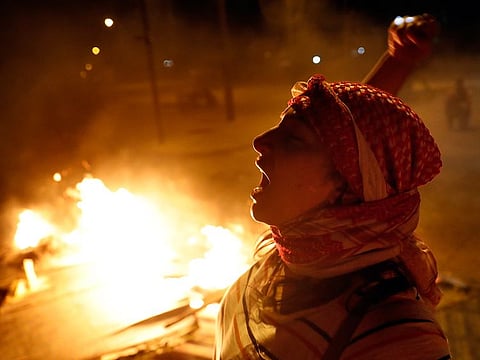Lebanon finds itself on the brink
Once a magnet to tourists, students and businesspeople, country’s ecomomy is now reeling

We all remember this from Economics 101 in our Freshman year at college: Societal collapse could be attributed to any number of factors, including depletion of resources, loss of cultural élan, decay of social cohesion, rising inequality and brazen-faced corruption.
Look, you and I, humble laymen together, don’t have know what a derivative is or what an arcane law like the coefficient of cross elasticity, dear to financial experts, concerns itself with, all in order to understand the economic woes afflicting Lebanon today. The country, very simply, is spiralling out of control.
So said Michel Bachelet, the UN Commissioner for Human Rights, last Friday, sounding the alarm over Lebanon’s dire economic situation and its need for structural reform.
The long and short of it is that Lebanon is indeed on the brink of catastrophic social collapse.
Lebanon, the smallest sovereign state on the Asian continent, was once a cosmopolitan country with the highest Human Development Index and GDP per capita in the Arab world outside the Gulf states, and a magnet to tourists from everywhere, who loved its fine cuisine, welcoming summer resorts, Mediterranean beaches, ski chalets in the Cedar Mountains, not to mention also students from everywhere, who considered themselves fortunate when admitted to its prestigious academic institution, the American University of Beirut, is today a nation down on its luck.Fawaz Turki
When the lights go out on a country’s economy, its currency collapses, families’ nest eggs, that they had spent a lifetime saving, are wiped out, breadwinners can’t put food on the table, and the social world of an entire nation — whose affiliative mechanisms act to stabilise a community’s quotidian life — goes to hell in a hand basket in front of the very eyes of its own citizens, well, we know it is time to ask tough questions to which equally tough answers must be given.
With inflation skyrocketing, large swaths of the population are unable to meet the costs of basic goods. Among these folks are formerly prosperous middle class professionals who had never imagined that they would ever be relying on food handouts, but who nevertheless could be seen sheepishly standing in line at charity food distribution centers — all of it playing out in the midst of the sudden shock of a pandemic.
Societal collapse
This societal collapse is the result of decades of economic mismanagement, rigid partisanship by self-serving elites and, let’s face it, bold-as-brass corruption. To start with, the government appears to have relied on increasing amounts of debt to pay its bills, while failing to carry out reforms that would’ve bolstered the economy and enabled it to receive international aid.
Talks with the International Monetary Fund (IMF) have gone nowhere — and there have been seventeen of these since mid-May — leaving Lebanon, a small nation with a population of less than eight million, the third indebted in the world.
And international donors have refused, for understandable reasons, to unlock the $11 billion pledged in 2018, pending major economic reforms and anti-corruption measures, which remain pending as we speak.
The collapse — and collapse, believe me, it is — began with a nationwide shortage of dollars, to which the Lebanese pound is pegged. Since Lebanon exports little, the country’s primary source of greenbacks has been large deposits in the central bank, known as Banque du Liban, from wealthy investors.
Higher interest rates
The deposits were needed to fortify the pound. To keep them coming, the bank offered higher interest rates for large deposits, whose interest yields could be covered only by new deposits — at even higher interest rates
Sounds like a familiar scam? Sounds like that to you because you’ve heard of Charles Ponzi, the namesake of the Ponzi scheme. And, yes, you know that Ponzi schemes sooner or later run out of gas and everything comes crashing down. And that’s what happened last year to Lebanon’s central bank: New depositors, smelling a rat, refused to deposit and old ones demanded their money back.
Imagine a central bank — say, the Federal Reserve in the US or the Bank of England in the UK — the financial institution given privileged control over a nation’s production and distribution of money and credit as well as the formulation of monetary policy, engaged in such unorthodox tactics! No doubt a grand jury would’ve gotten busy issuing indictments right, left and centre.
Trickle-down effect
The tragedy here is that the scheme, in a trickle-down effect, has hit small bank account holders whose individual banks, on orders from Banque du Liban, have limited them to small dollar withdrawals, or in many cases stopped handing out withdrawals altogether.
Check out photos in your newspaper of these ordinary Lebanese, with pained looks on their faces, sweating in the summer heat, lining up outside their banks to see whether they could withdraw, please, pretty please, any of their own money deposited there — money that, over the last year, has lost — hold on to your hat — 80 per cent of its value against the dollar.
Lebanon was once a cosmopolitan country with the highest Human Development Index and GDP per capita in the Arab world outside the Gulf states, and a magnet to tourists from everywhere, who loved its fine cuisine, welcoming summer resorts, Mediterranean beaches, ski chalets in the Cedar Mountains, not to mention also students from everywhere, who considered themselves fortunate when admitted to its prestigious academic institution, the American University of Beirut, is today a nation down on its luck.
— Fawaz Turki is a journalist, lecturer and author based in Washington. He is the author of The Disinherited: Journal of a Palestinian Exile.



